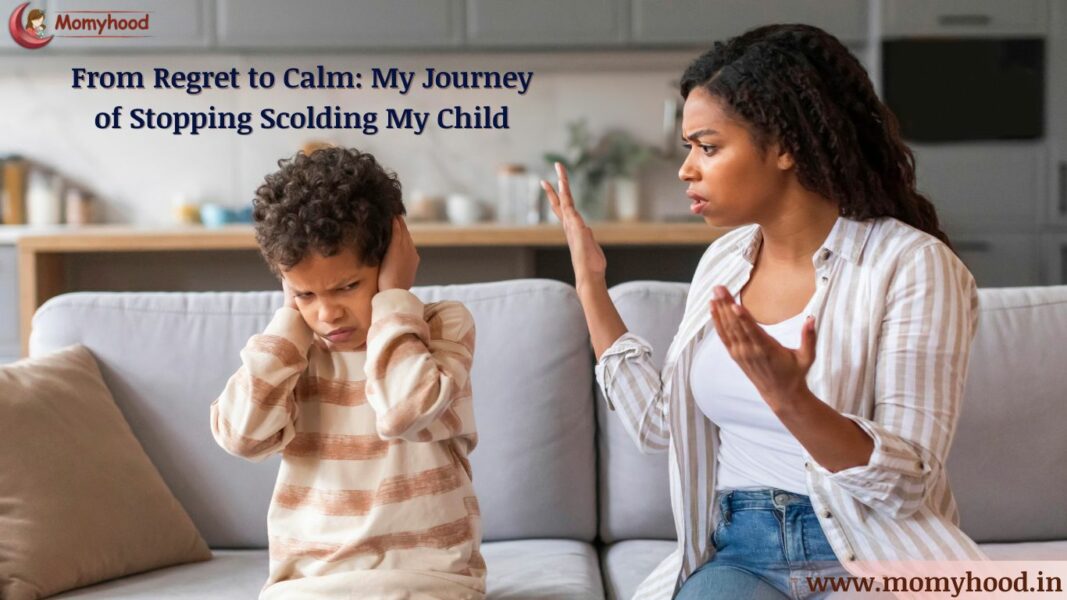Yes, I regret it a lot. Because sometimes, out of frustration and tiredness, I scold my seven months old son. But later on, I regret and wish I could rewind time and handle the situation with patience. Many of us vow not to yell at our kids after reading parenting blogs and articles. But is it really possible to stick to that decision of not scolding a child?
Frankly, for me, it is not. Because every time I raised my voice, I realized my mistake right after. In the awful silence after, remorse washes over me. I know that deep down, he’s just a curious, energetic little person trying to make sense of this big world. Yelling seeds doubt, anxiety and low self-worth that can have lasting impacts. I certainly don’t want Hitarth to grow up viewing harsh verbal discipline as normal or okay.
So now, after understanding more and more about child care, I came up with a solution on how you can control yourself about scolding your child. Like many parents, I vowed early on to never yell or scream at my child. But making that intention a reality has been an immense challenge requiring conscious effort daily. If you too are on the journey to mindful, calm parenting, I’ve learned some helpful strategies along the way.
Many parents struggle with how to stop yelling at kids, but with the right strategies, calm parenting is possible. So here I am going to share what I do when my kid is naughty. And how should we stop them from doing anything that they shouldn’t? However, before checking the tips, let’s know how our scolding a child or yelling at them can impact their behavior in the short and long term.
Contents
- 1 Effects of Scolding a Child
- 2 9 Practical Calm Parenting Tips to Stop Yelling at Your Child
- 3 Parent Voices: Real-Life Stories from Moms Breaking the Yelling Habit
- 4 Myths and Facts About Scolding a Child
- 4.1 Myth 1: Scolding a Child Is the Best Way to Discipline
- 4.2 Myth 2: Scolding a Child Helps Them Learn Faster
- 4.3 Myth 3: If You Don’t Scold Your Child, They Will Misbehave More
- 4.4 Myth 4: Scolding a Child Only Affects Their Behavior, Not Their Emotions
- 4.5 Myth 5: Once You’ve Scolded a Child, They Understand What They Did Wrong
- 5 Final Thoughts: Breaking the Cycle
Effects of Scolding a Child
Short-Term Effects of Scolding A Child
You’re likely to see some of the short-term psychological effects of yelling at a child shortly after you’ve done it.
- Increased aggression and frustration in children
- Anxiety and fearfulness
- Withdrawal from parents and reliance on peers
- Children mimicking yelling as a way to communicate
Long-term Effects of Scolding A Child
The short-term psychological impacts may cause you to consider how you may better respond to your children when you are upset or frustrated with them or for any other reason. When parents verbally abuse the kids, the effects can continue for a long time.
- Low self-esteem and negative self-image
- Increased risk of bullying behaviors
- Difficulty in forming healthy relationships
- Higher chances of depression and anxiety
- Behavioral problems that persist into adulthood
That’s some heavy stuff, right? Reading about the psychological impacts was a wake-up call for me to get serious about breaking this destructive pattern. Now that we understand the potential consequences, let’s dive into the strategies that have worked for me and other moms.
9 Practical Calm Parenting Tips to Stop Yelling at Your Child
Overall, the psychological impacts of yelling at kids are detrimental and long-lasting. Don’t be too hard on yourself if you yell now and then. Consider approaching the child soon after you’ve yelled and explained what has upset you, as well as apologizing. If you work to avoid yelling, you’ll have fewer of these instances in the future, which means you’ll have fewer things to apologize for. The additional benefit of apologizing is that it allows you to model behavior that displays how the child might work to mend a connection they may have harmed in the past.
Now, here are some tips & calm parenting strategies I have tried with my seven months old & I’ve found these very easy & helpful, which can prevent you from scolding a child.
Diverting their Mind
When my son does something he shouldn’t, I redirect his focus. For example, if he tries to put a non-edible object in his mouth, I immediately swap it with something safe like a biscuit.
You must have heard about W-sitting, the child sitting on his knees, be it with open thighs or joining them. Click here to know about w-sitting and why it is not correct to sit.
Whenever your toddler sits like that, Don’t say, ‘change your position’ or ‘don’t sit like that, go to them, and instead of scolding, change their position yourself and make them sit with any other comfortable position. Remember, actions speak louder than words.
Also read: Creative Discipline Methods – How I Creatively Discipline My 4-Year-Old Son, Hitarth
Engage, Don’t Ignore
Sometimes, we tend to ignore the highly naughty child because we are too tired and don’t want ourselves to be involved in child naughtiness. But this is very unfair and instead of ignoring them, play with them by singing, painting, reading, or merely talking because you are responsible for shaping your child’s spirit.
Talk with Love
Never think that your child does not understand what scolding is- because they do understand by seeing your facial expressions. Instead of scolding a child and shouting, talk to them lovingly even if they do not know what you are saying because slowly and steadily, they will know what is right and wrong for them. I ensure that even when correcting my child, I use a calm and loving voice.
Change the scenery
Instead of scolding a child, if you feel your anger escalating, remove yourself and your child from the trigger situation. I’ll tell Hitarth “Let’s go look out the window!” and that break is often enough for both of us to reset.
Hold them
If your toddler is making any mischief, hold him, instead of scolding him. Take him out for a while, which is beneficial in many ways; firstly, he will indulge in another thing, explore new things around him, & he will know the experience of relaxing into loving arms.
Praise the positive
I noticed Hitarth was so much more receptive when I acknowledged his good behaviors. “Thank you for playing so nicely! You’re being a great listener.” The positive reinforcement motivates them to keep it up. Additionally, small rewards like a high-five or an extra bedtime story can reinforce good behavior.
Make Eye Contact
Adults and children can have a powerful interaction by making eye contact. When you speak to children from such a high point, some kids are scared. They may respond better if you can get down to their eye level.
Encourage Two-Way Conversations
Encourage two-way exchanges while discussing with them about negative decisions they’ve made. It’s OK to be blunt about the types of errors they made but do so in a way that preserves their dignity and allows them to express their thoughts. This builds trust and emotional intelligence.
Using Positive Affirmations and Manifestation Techniques
One thing that has helped me tremendously in breaking the habit of scolding a child is the power of manifestation and positive affirmations. The subconscious mind plays a crucial role in shaping our parenting approach. Here’s how I incorporate it:
Affirmations for Calm Parenting
- I am a patient and loving parent.
- I handle my child’s behavior with understanding and care.
- My child is learning and growing every day.
- I choose to respond calmly in every situation.
I repeat these affirmations daily, especially during difficult moments. It rewires my brain to react with love rather than frustration.
Sleep Talk Technique
I also use the sleep talk technique, where I whisper positive affirmations to my child while he sleeps. Over time, this helps reinforce positive behaviors in him, making discipline easier without the need for scolding a child.
Also read: The Power of Bedtime Conversations: How Talking with Hitarth Eases My Parenting Journey
Visualization
Whenever I feel my patience slipping, I take a deep breath and visualize a calm and happy interaction with my child. This simple technique helps me stay composed and avoid unnecessary outbursts.
Parent Voices: Real-Life Stories from Moms Breaking the Yelling Habit
Parenting is tough, and it’s always good to hear from others who are on the same journey. So, I asked fellow moms about their struggles with scolding, and here’s what they shared;
1. Neha’s Experience: Patience Through Play
Neha, a mother of a 4-year-old boy named Raghav, shared that there were days when she would lose her cool over Raghav’s tantrums, especially when he would refuse to eat his food. “I’d scold him, and then instantly regret it,” she said. However, she discovered a better way to handle the situation by engaging Raghav in fun activities. “Instead of scolding, I started making mealtimes fun by turning it into a game. I would pretend the food was a spaceship, and Raghav loved it! It made me realize how important it is to stay calm and find creative ways to connect with him.”
2. Aditi’s Journey: Apologizing and Rebuilding Trust
Aditi, a mother to twins, Arjun and Aanya, shared how she used to yell when both children would fight over toys. “The noise would drive me crazy, and I’d snap at them,” she confessed. But one day, after reading an article on the effects of scolding, Aditi decided to try something different. “I started apologizing to them after I lost my temper. I would kneel down to their level and say, ‘Mommy was upset, and I shouldn’t have yelled. I’m sorry.’ It wasn’t easy, but I noticed that my kids started responding better and trusted me more when I showed them empathy.”
3. Suman’s Approach: Redirecting Energy Instead of Yelling
Suman, a mother of a 5-year-old boy, Vivek, said that she often found herself scolding him when he got too noisy or playful, especially when they were out in public. “I used to feel embarrassed when he acted out in public,” she admitted. However, she learned to redirect his energy instead of raising her voice. “Whenever Vivek started acting up, I would take him for a walk, show him interesting things around, and engage his curiosity. He loved it, and I felt like we were both learning how to handle our emotions together.”
These stories not only reflect real struggles many parents face, but also show that there are always opportunities for growth and positive change in how we approach discipline and patience.
Myths and Facts About Scolding a Child
Understanding the impact of scolding a child can be confusing, with many myths circulating about the best ways to discipline. Let’s debunk some common misconceptions and explore the truth behind them.
Myth 1: Scolding a Child Is the Best Way to Discipline
Fact: Scolding a child often leads to increased fear, anxiety, and negative emotions. Positive discipline techniques, like redirecting behavior and using calm communication, are more effective in teaching children right from wrong.
Myth 2: Scolding a Child Helps Them Learn Faster
Fact: While scolding might grab a child’s attention momentarily, it doesn’t encourage learning or positive behavior change. Children learn best through modeling and positive reinforcement, not through negative emotions linked to scolding.
Myth 3: If You Don’t Scold Your Child, They Will Misbehave More
Fact: It’s a common belief that if you don’t scold, your child will become spoiled or misbehave more. However, using positive discipline techniques helps children understand boundaries and encourages self-regulation. Children are more likely to respond to kindness and clear guidance than to harsh criticism.
Myth 4: Scolding a Child Only Affects Their Behavior, Not Their Emotions
Fact: Scolding a child affects both their behavior and their emotional development. Consistently being scolded can lead to low self-esteem, anxiety, and poor self-image. Children exposed to emotional discipline often struggle to manage their own emotions in a healthy way.
Myth 5: Once You’ve Scolded a Child, They Understand What They Did Wrong
Fact: Scolding does not always help children understand the reasoning behind their behavior. Children may not be able to connect their actions with the negative consequences of scolding. It’s important to explain why their actions were wrong and guide them to make better choices.
By distinguishing between these myths and facts, we can take a more thoughtful approach to scolding a child and adopt healthier, more effective discipline practices that nurture emotional growth and understanding.
Final Thoughts: Breaking the Cycle
For all the parents out there still struggling with raising your voice more often than you’d like – you’re not alone! Staying calm 100% of the time is nearly impossible. What’s important is your commitment to doing better and being self-aware.
If you do end up scolding a child, don’t be too hard on yourself. Apologize, reconnect, and use it as a learning opportunity. When possible, get down on their level afterward, give a hug and explain: “Mommy got really frustrated earlier, but I’m sorry I yelled. That’s not how I want us to talk to each other.”
Breaking the habit of scolding a child takes time, but with consistent practice, you’ll see remarkable changes in your child’s behavior—and in yourself.
I still have plenty of room to grow myself, but I’ve come such a long way from where I started. The profound warmth and joy I feel in our home when resolving conflicts with patience is immensely rewarding. My ‘no-yelling’ evolution continues, one meltdown at a time.
If you like this article, please like, share, and comment. Stay happy and always blessed, and never regret anything. After all, you are the caregiver of your kid, and you have the right to take care of your child the way you want.
Do you have a story to share about breaking the habit of scolding a child? Join the conversation in the comments below.
Your comments and shares do more than just support our blog—they uplift the amazing moms who share their stories here. Please scroll down to the end of the page to leave your thoughts, and use the buttons just below this line to share. Your support makes a big difference!




Beautifully expressed..very informative ??
Nice blog
Great post. I am facing many of these issues as well.. Susie Brandtr Shelia
This is one awesome blog post. Thanks Again. Want more. Else Dolf Tarton
Excellent blog here! Also your website loads up fast! What web host are you
using? Can I get your affiliate link to your host?
I wish my web site loaded up as fast as yours lol
My website: vpn special code
Great information shared.. really enjoyed reading this post thank you author for sharing this post .. appreciated
You’re so awesome! I don’t believe I have read a single thing like that before. So great to find someone with some original thoughts on this topic. Really.. thank you for starting this up. This website is something that is needed on the internet, someone with a little originality!
This was beautiful Admin. Thank you for your reflections.
Hi there to all, for the reason that I am genuinely keen of reading this website’s post to be updated on a regular basis. It carries pleasant stuff.